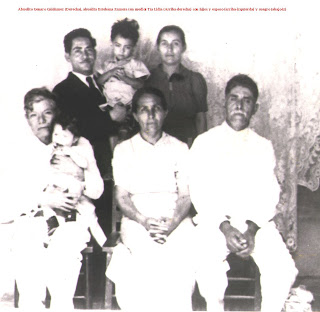My mom, Maria Mirtala Galdámez (Zamora) turned 87 years old. She was born in El Salvador, in the city of
Chalatenango in 1928, one year before the Great Depression. In was a rural town back then which I have never visited. This town is where the surname Galdámez surged. Her last name is Basque in the form of “galdames” which is from the Northern region of Spain and is originally spelled Galdames but was changed to sound more Castillian to Galdámez. The name means “iron cauldron” in Euskara (Basque). How the Basque “Galdames” made it to El Salvador is hard to trace.
Her mother was Estebana Zamora and her father was Genaro Galdámez. They had eight children, I believe, six girls (who all had “Maria” as their first name) and two boys. Of them, there only my two uncles are left and my mom, the youngest of the girls.
 |
| My grandmother is in the middle and my grandfather on the right. I didn’t get to know any of them. |
My mom (on the right), my aunt Lidia on the left and my aunt Amalia in the center.
My mom experienced the hard rural life. She received very little care and attention, as parents back then were (she was a product of her times), and worked from an early age. She wore no shoes until she was a teenager and went to school up to third grade. She learned how to read and write at a very basic level.
Being the next to the youngest of my mom’s children I have very few recollections of my childhood. I was born when she was 40 years old. I also know very little of her history except what I have learned from her and I have no recollection of what she looked when she was young.
My mom about 47 years of age.
My mom had ten children, out of which one did not survive, the first one which I was told, was a boy. There are six girls and two boys, of which I am the eighth one. My mom’s history is a bit complicated which I care not to try to explain because I don’t have enough information and my mom rarely talks about it.
Here I am with my two youngest sisters and my mom as we looked when we arrived to the United States in 1981.
 |
| My mom and her older brother |
My mom, for the most part, has been a single mom. She worked up until we came to the United States. She worked in the meat market (at the municipal market) of Mejicanos, a city close to where I remember living. She sold meat there and because of this, I remember never lacking meat. We lived in rural place called Mariona and there lived in a one room house made of wood planks that had gap in between which allowed others to see inside, uneven dirt floors and roof made of aluminum. Living in a tropical place, thunderstorms were common and the sound it made on the roof made it even scarier (not to say the dripping around the house due to the holes on the roof) and my mom would often scare us even more by saying, “¡Gran poder de Dios!” (Great Power of God).
I don’t remember much of childhood in relation to my mom. One occasion that I will never forget is when my friends and I decided to go to the river and shower. On our way back, being a stubborn boy, I refused to go the same way back home with my friends and got lost. When my mom arrived home from work she asked about me and was told what had happened. She left everything and immediately went and looked for me. Upon asking, someone told her they had a seen a little boy without a shirt holding a can, eating an ice cream and walking with a woman. She found me. I am so glad she did or I would be part of another family.Another occasion that I remember was when my friends and I decided to go explore, as it is so common in rural places. Walking in canyons was something I enjoyed. I loved exploring and on this occasion, I stepped on what appear solid ground. It was actually a whole that was covered with wood plank. I fell and broke my arm. Again, I remember my mom arriving from work and taking me to the hospital. I also remember the cast I had to wear. These two events show my mom’s absolute care for me.
My mom isn’t perfect nor is anyone of us. She has many weaknesses. One of them is that she is not inclined to ask forgiveness or showing affection. There was affection for me when I was very young but not after that. I don’t remember she has ever said “I love you,” either. I know this is anathema now. But I have never doubted my mom’s love for me. I am certain that she would give her life for
anyone of her children. I rather have her actions than her words. I am ok with that.
 |
| My mom and myself November 2014 |
There are three characteristics that stand out in my mom. One is that she is a selfless giver who has no desire to have money or possessions. As I am told by my sisters, my mom had opportunities to make money but she had no interest in it. She used it to help others. She helped many people and she never did it out of interest for her. Even to this day, she cares nothing about money or possessions. In fact, when she gets new clothes, she uses the old ones and saves the new ones. I remember when we were already in the US, I would ask my mom money when I needed something and she would say, “¡Go get it!” She didn’t care about what I got. Of course I only got what I needed. My mom loved to cook and I miss it. I loved her food and so did many of my relatives who often came to visit her. My mom has always be a selfless giver. In this area, I don’t come close to how my mom. I am still learning.
My mom also holds no grudges or bitterness toward anyone. I could list all the things people have done to her, that I know off, and how she just brushes them away. Her compassion dominates her life.
I know she wasn’t perfect and had a strong temperament but this never lasted. This is another area that I have learned from her.
Care and concern for others is another quality my mom has. She has always cared about people (and not things). My mom cares so much about others that it literally consumes her thoughts. She thinks about them over and over. This hasn’t helped her in her old age but never-the-less I know she cares. I often wish I could get in her mind and help her out of it. Ironically, as it happens with those who care for others, they are often forgotten. When my mom was in good health and older, she has droves of people show up to her house on weekends to enjoy her meals and company. She is now visited by very few relatives.
 |
| My and four of us |
My mother, three of my sisters and myself came to the United States in 1981. We lived in Los Angeles for a year before settling in Santa Ana California in 1983. It was in Santa Ana, where we started attending a Spanish Baptist Church. There, myself and two of younger sisters came to know Christ. My mom initially started coming to church and then dropped off. Eventually, the Lord moved in her heart and came to know him. She was also baptized. Her life change was evident but her growth spiritually was not as fast. When I became a church planter, she also attended there. Eventually, as she got older attending church was difficult for her. For the last ten years or so, she has lived in assisted living and her health has declined.
 |
| my mom and my older son and his wife |
When I left ministry and started teaching full time, she often reminded me of my calling. She would say, “I will not die before seeing you in ministry again. That’s what God called you for.” This year, her desire and prayer has come true. I am back in full time ministry.I know my mother isn’t perfect, but she is perfect for me. She is perfect not because of what she isn’t but because God chose her for me to give me life. God knew she was the best for me. I believe God is good and one proof is my mom. I am thankful that all my kids have had a chance to know her even our two adopted ones. In fact, she loves our little daughter. When we visited weekly, it brought her great joy!
My mom on her 87th birthday. The Galdámez’s have a trait of not smiling in pictures. Once in a while we get one.
As of today (1/16/2015) my is very delicate health wise and we are not certain of the outcome. Her time to be with Christ and enjoy His comfort for ever may be at hand. Whatever the outcome, I am so grateful for her, as a mom, grandmother, and great-grandmother. I know that in eternity all her imperfections will be gone and she will be complete because she will be like Christ. What Psalm 16:11 says will be true in her and all who know Christ:
You make known to me the path of life;
in your presence there is fullness of joy;
at your right hand are pleasures forevermore. (ESV)






















